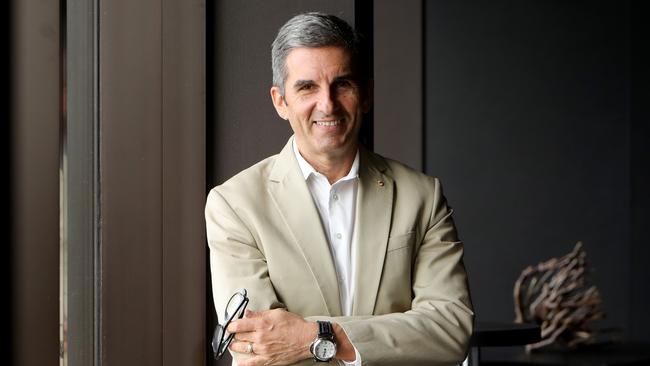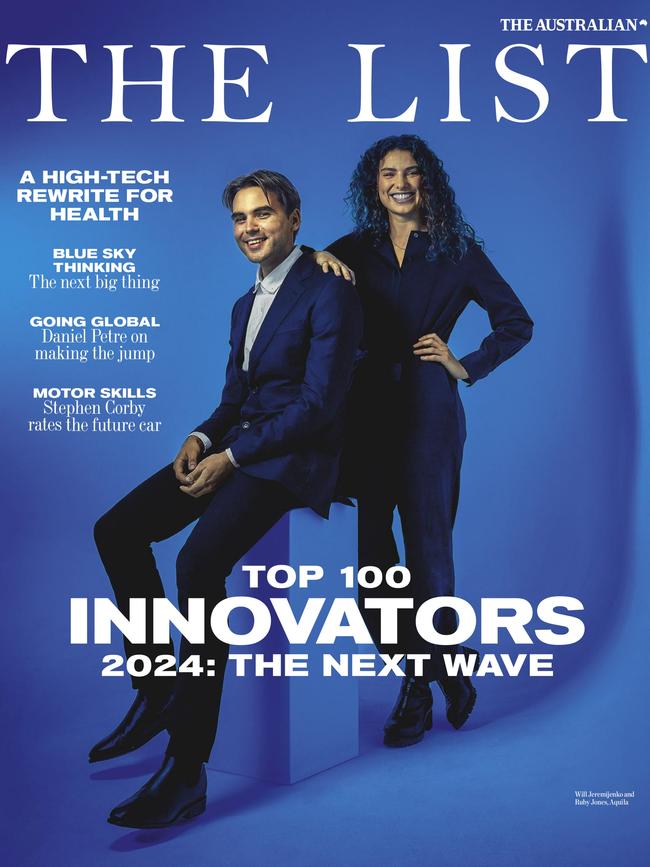Australia needs to scale up or risk being left behind in tech, says Daniel Petre
Change is happening everywhere, and fast. Australia needs to pay attention and respond appropriately to ensure we can harness it to our own benefit, says entrepreneur Daniel Petre.

Innovation has always been a cornerstone of human progress, driving economic growth, enhancing quality of life, and addressing some of the most pressing challenges faced by humanity.
Going forward, the state of global innovation is more dynamic than ever, influenced by major technological advancements, shifting economic paradigms, and the urgent need for sustainable solutions.

Get your copy of The List - Top 100 Innovators in The Australian on Friday.
A word of warning: trying to use share prices as a clear guide on the status of global innovation is a massive mistake. Innovative products and their companies will be valued at different times using different methodologies. The share price of a company, specifically one that is still in high-growth mode, might decline by 50 per cent – as many public tech companies did in 2001, 2008 and 2022 – and yet adoption of their products may continue to grow until, over time, they become multibillion-dollar companies.
The adoption of an underlying technology and then particular products related to it is an important marker to monitor. Everything else is noise.
What’s on the horizon?
If one were to pick the next waves of innovation, it would be impossible to not choose AI (machine learning), climate tech and biotech/biomed as the three most significant waves of innovation over the next 10 or more years.
The rise of artificial intelligence (AI), machine learning and automation is reshaping industries and creating new opportunities. AI, in particular, is being leveraged to optimise processes, enhance decision-making and improve customer experiences. Industries such as healthcare are experiencing transformative changes, with AI-powered diagnostics and personalised medicine becoming more prevalent.
It is also important to note that each new release of an AI platform (maybe 12 to 18 months apart) brings with it maybe 10 to 100 times better functionality. Again, focusing on current “hallucinations”, or error rates, misses what is happening. Even in the past two years, accuracy and breadth of application have increased at a rate no one really expected. All you need to do is see how far we have come in such a short time to get a sense of where we will be in five to 10 years.
Soon these platforms will be orders of magnitude better than humans at almost all tasks and, more than likely, be completely error-free.
The fight against climate change
As the effects of climate change become increasingly evident, sustainability has emerged as a critical focus for innovators worldwide. Companies and governments are investing in green technologies and sustainable practices to mitigate environmental impact. Renewable energy sources, such as solar and wind, are gaining traction, supported by innovations in energy storage and efficiency. There is also a lot of amazing work being done in climate adaptation technologies using CRISPR gene editing to provide both drought- and disease-resilient seeds and crops.
Additionally, circular economy models are being adopted, emphasising resource reuse and waste reduction. Innovations in materials science, such as biodegradable plastics and sustainable packaging, are also gaining momentum, reflecting a growing commitment to environmental stewardship.
The combination of AI and advances in robotics is supercharging innovation in the biotech and medtech arenas. Deepmind’s AlphaFold Server, powered by AlphaFold 3, can generate highly accurate biomolecular structure predictions containing proteins, DNA, RNA and other molecules. It wasn’t possible for humans to do this before this technology was developed, and it now allows for greater understanding as to how new molecules might work. As an outcome we will see very specific drugs designed by AI to solve very complex disease conditions in areas unaddressable by humans alone, due to the complexity of the problem.
The globalisation of talent has led to a more diverse pool of innovators, each bringing unique perspectives and ideas. Emerging economies, particularly in Asia and Africa, are starting to be seen as players, albeit minor at this stage, in the global innovation landscape.
However, many developing nations lack the infrastructure and investment necessary to participate in the global innovation economy. Bridging this gap is crucial to ensure all countries can benefit from technological advancements.
While the talent base is broad and global, it is important to note that innovation at scale goes where the money goes. The US remains the largest investor – private and public – into all things innovation focused, and reaps the benefits. China has massively accelerated its investment, and many global-first innovations are now coming out of that country. India is also investing heavily in research and development.
Global talent does not necessarily mean you have evenly spread global innovation. Great products are global from day one and there is often no need nor interest in “local”. Does anyone really think the average Australian would want to use a local search product over one with the data, features and scale of Google search?
Is there a market for a local competitor to the iPhone? Obviously not. That means, if we want to have the benefits (lots of high-paying jobs, billions of dollars of taxes paid) then we need to scale our innovation industry to produce more global products.
With the rapid pace of innovation comes the need to make sure we balance innovation with safety. Currently, the pace of technological advancement often outstrips the ability of regulatory frameworks to adapt. Governments worldwide are grappling with how to regulate emerging technologies such as AI and biotechnology while fostering innovation. Striking the right balance is a complex challenge.
Put simply, if Australia wants to maintain a high level of GDP and the resources to invest in having a stable and well-served society, we need to appreciate the increasing impact of innovation on our economy and respond accordingly.
Increased investment in research and development is essential for fostering innovation. Governments and private entities can create favourable environments for innovation by providing funding, tax incentives and support for start-ups. Encouraging cross-sector partnerships can also catalyse breakthroughs in various fields.
To sustain innovation, a focus on education and skills development is vital. Equipping the workforce with the necessary skills to navigate an increasingly digital landscape ensures individuals can contribute to and benefit from technological advancements. Lifelong learning initiatives and partnerships between educational institutions and industries can help bridge the skills gap.
To create a more equitable innovation landscape, efforts must be made to include under-represented groups in the innovation process. Supporting female entrepreneurs, minority-owned businesses and individuals from marginalised communities can unlock new ideas and solutions. Inclusive innovation not only drives economic growth, but also fosters social cohesion.
The future is bright, if we pay attention and plan accordingly.
Daniel Petre is one of Australia’s leading technology innovators and entrepreneurs who has held senior executive and board positions on several IT and related companies and organisations. He is an adjunct professor at the University of NSW and a board member of the federal government’s National Reconstruction Fund Corporation.



To join the conversation, please log in. Don't have an account? Register
Join the conversation, you are commenting as Logout